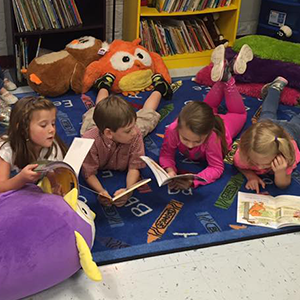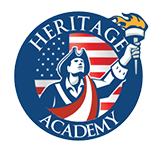Elementary School
 Successful formative years for any student are key to ongoing academic success in higher grades, and eventually college. A love for learning, coupled with good student habits, are best developed in the beginning with great teachers in a small class. Building student confidence and success in elementary school carries them into successful middle and high school years.
Successful formative years for any student are key to ongoing academic success in higher grades, and eventually college. A love for learning, coupled with good student habits, are best developed in the beginning with great teachers in a small class. Building student confidence and success in elementary school carries them into successful middle and high school years.
Heritage Academy maintains a traditional educational format for students in Kindergarten to fifth grade. The Academy stresses incremental review in the lower grades, and actively keeps concepts learned earlier in the academic year current as more concepts are taught. When appropriate, Heritage elementary students are asked to think and make determinations in their learning. Heritage Academy elementary school students are tasked to think critically as they advance in each grade.
A Lifelong Love of Learning
 Heritage Academy instills a ‘lifelong love of learning’ at the elementary school level. Passionate teachers who lead students to critical thinking concepts open young minds to the joys of learning and education. Heritage teachers energize their students with confidence and push them to be active learners. Heritage students want to come to school, participate, and engage in the learning process.
Heritage Academy instills a ‘lifelong love of learning’ at the elementary school level. Passionate teachers who lead students to critical thinking concepts open young minds to the joys of learning and education. Heritage teachers energize their students with confidence and push them to be active learners. Heritage students want to come to school, participate, and engage in the learning process.
It is the purpose of Heritage Academy to teach our students to think carefully through all disciplines in order to develop an understanding of the natural progression in learning rather than teaching to a test. Having the emphasis on tests does not teach a desire to self-learn, self-grow, and self-improve. Teaching a child to love learning makes education its own reward.
Critical Thinking
Students who think critically are able to outperform non-critical thinking peers in most cases. Critical Thinking allows students to identify elements of a given problem or topic, develop a path to solve the problem or topic and arrive at the correct solution. They do not rely on rote learning, that favors ongoing repetition and testing as the only means to educate.
Critical thinking is a rich concept that has been developing throughout the past 2500 years. It is self-guided, self-disciplined thinking which attempts to reason at the highest level of quality in a fair-minded way. People who think critically consistently attempt to live rationally, reasonably, empathically. They are keenly aware of the inherently flawed nature of human thinking when left unchecked. They strive to diminish the power of their egocentric and sociocentric tendencies. They use intellectual tools – concepts and principles that enable them to analyze, assess, and improve thinking. They work diligently to develop the intellectual virtues of intellectual integrity, intellectual humility, intellectual civility, intellectual empathy, intellectual sense of justice, and confidence in reason.
(The Critical Thinking Community)
Heritage Academy believes strongly that the best student is one that can think critically, independently, and with confidence. Whenever appropriate to the daily lesson, Heritage teachers will challenge their students to think and arrive at solutions to problems or topics.
Biblical Worldview
Every person sees the world from a certain point of view. In many schools, it is a secular humanist view from which all subjects are taught. At Heritage, every subject is taught from a Biblical viewpoint. The activities, projects, school-wide presentations, and parallel reading are carefully selected so that they embrace the Christian world view. Our goal is to grow students who will view the world through the lens of God’s Word thereby becoming productive godly citizens. Heritage maintains a non-denominational approach as teachers begin each day with prayer and devotions.
Small Class Size
Heritage Academy maintains an excellent average student/teacher ratio of 7:1. This means, on average, that there are seven students in a class with one teacher. Heritage provides an outstanding amount of teacher contact time per student.
For example, if your son or daughter is in a large 30 student class for one hour, they can expect only two minutes of contact time with the teacher during that period. At Heritage, the teacher’s contact time jumps to almost nine minutes. Teachers at Heritage make every effort to prevent students from flying under the radar or fall through the ‘cracks.’ They will be engaged, challenged, and pushed.
Semester Schedule
Heritage Academy has six grading periods in a two-semester format. There are three grading periods per semester. The first semester typically begins in August. The second semester typically begins in early January. The online calendar provides specific dates.
Grading Scale
Heritage Academy uses the traditional seven point grading scale for determining grades. The following grading scale is used for 1st through 8th grades.
A 100-93
B 92-86
C 85-78
D 77-70
F 69-0
Kindergarten students are graded Pass/Fail only.
Academic Recognition
Throughout the school year, Heritage stops to recognize outstanding student achievement. The Academy currently provides two routes for recognition. They include the Headmaster’s List and the Honor Roll.
The Headmaster’s List – Heritage students who achieve straight A grades for a given grading period qualify for the recognition.
Honor Roll – Heritage students who achieve A and B level grades may qualify for the Honor Roll.
Abeka and Bob Jones Curricula
Heritage Academy uses the Abeka and Bob Jones University Press Curricula. Both are comprehensive, quality curricula and materials that present the concepts from a biblical perspective. They both feature professionally illustrated textbooks, teaching aids, hands-on activities, challenging exercises and purposeful repetition. ABeka provides the reinforcement of concepts from subject to subject.
The ABeka Curriculum has a great phonics-based approach for English. It also features a repetitive system for mathematics instruction, where previous math concepts are kept fresh long after a student has mastered an area. Reinforcement is used effectively in both areas to ensure proper absorption of the lesson material.
Bob Jones University Press’s elementary Heritage Studies product line guides students in analyzing and evaluating historical events, world cultures, and primary sources from a biblical worldview. The engaging lessons and activities, including graphic organizers, reinforcement pages, biographies, map skills and study guides develop and strengthen students skills. Students learn to relate Social Studies to other academic disciplines and they learn how to make wise decisions about their world.
Bob Jones elementary Science equips students to apply science to life. Explorations in scientific inquiry give students opportunities to observe, classify, measure data, analyze data, make inferences, and communicate their findings.
Phonics/Reading/Writing

A student who has a strong background in phonics can ‘sound out’ more complicated words and phrases later in their educational career, and infer word meaning faster and with more accuracy. Basically, phonics students decode a word to determine its pronunciation and meaning.
Phonics is a critical skill for reading mastery, as students can engage new words without feeling lost when challenged with an unknown word or phrase. Phonics is a foundational effort that establishes future success for the Heritage student.
Heritage Academy elementary school students are introduced to reading and writing in kindergarten with basic fundamentals like teacher storytelling, student driven imaginative storytelling and basic comprehension. From there, students are encouraged to read and write. Both areas are critical thinking skills.
Heritage Academy strives to engage its elementary school students in reading whenever possible. Reading is necessary in the Academy’s course work, and it is encouraged for leisure. Reading builds subject material experience, reading comprehension and vocabulary.
Student writing at Heritage starts with a pencil and paper. Students write to express thoughts and ideas, and the writing process directly supports the Academy’s focus on critical thinking skills. Students are challenged at all grades to use effective writing to communicate their solutions and views with others, especially their teachers.
Cursive handwriting is an important aspect of elementary school writing. In addition to providing a valuable communication skill, students in 2nd grade and older further develop their fine motor skills with cursive handwriting. Falling out of favor in most school systems, cursive handwriting remains a key elementary school skill at Heritage Academy.
The fundamentals of grammar are a key aspect of Heritage’s reading and writing effort. Subjects, predicates, and the parts of speech are introduced to students. Heritage students are graded on their grammar, and are expected to employ its proper use in their writing.
Math
Speed and accuracy is the goal with Heritage Academy’s elementary school mathematics lessons. Number problems are given regularly on current and past mathematics concepts. Students are required to complete these problems quickly with as few errors as possible. By 5th grade, Heritage students should have mastered computation skills and be ready for advanced mathematical concepts.
Hands on Learning
Elementary school aged children can only sit and listen effectively for so long. They enjoy doing activities that directly engage their subject material. When students are directly allowed to engage their subject, the best learning occurs. With Academy support, Heritage teachers employ guest speakers and demonstrations in their coursework. Students are more receptive to learning with interactive enrichment activities. Scheduled field trips also provide dynamic aspects to the educational process.
The 4th Grade
In addition to their normal curriculum and as a means of enhancing their study of Virginia history, 4th graders work to create a Virginia History Scrapbook throughout the year. The goal is to become more knowledgeable about the geography and history of our state and in doing so, develop pride in calling Virginia home.
The 5th Grade
In order to better prepare 5th graders for middle school, they are introduced to Heritage Academy’s Annual Middle School Projects. The 5th grade students are introduced to the same middle school projects, but at 5th grade level. Projects include: The DAR American History Essay Contest and Modern Woodmen of America School Speech Contest. Learn about these projects in Annual Class Contests and Projects.
Additionally, the Heritage teacher is free to explore and introduce additional projects that align with their course material.
